
Eco mont-Journal on Protected Mountain Areas Research
Scope & Guideline
Unlocking the secrets of mountain ecology for a sustainable future.
Introduction
Aims and Scopes
- Biodiversity Conservation:
The journal emphasizes research that contributes to the understanding and preservation of biodiversity in mountain ecosystems, highlighting species interactions, habitat requirements, and conservation strategies. - Sustainable Development Practices:
It promotes studies that explore sustainable practices in protected areas, focusing on the balance between conservation efforts and local community needs, including tourism and resource management. - Climate Change Impact Studies:
Research focusing on the effects of climate change on mountain ecosystems is a core area, examining shifts in species distributions, phenology, and ecosystem functioning. - Community Engagement and Governance:
The journal also addresses the role of local communities in conservation efforts, exploring governance models and participatory approaches that enhance stakeholder engagement. - Transdisciplinary Research:
It encourages interdisciplinary studies that integrate ecological, social, and economic dimensions in mountain research, fostering collaboration among scientists, policymakers, and practitioners.
Trending and Emerging
- Citizen Science Initiatives:
There is an increasing emphasis on citizen science projects, which engage the public in data collection and monitoring of biodiversity and environmental changes, fostering community involvement in conservation. - Technological Applications in Conservation:
The use of advanced technologies, such as geospatial tools and big data analytics, is on the rise, facilitating more effective monitoring and management of mountain ecosystems. - Integrative Approaches to Ecosystem Management:
Emerging themes include integrative management strategies that encompass ecological, social, and economic factors, highlighting the need for holistic approaches in conservation. - Ecosystem Services Valuation:
Research focusing on the valuation of ecosystem services provided by mountain areas is gaining traction, emphasizing the importance of these services for local communities and economies. - Human-Wildlife Conflict Resolution:
A growing number of studies are dedicated to understanding and resolving conflicts between human activities and wildlife conservation, particularly in areas where protected zones overlap with human habitation.
Declining or Waning
- Historical Ecological Studies:
There has been a noticeable decline in papers that focus solely on historical ecological studies of mountain regions, potentially overshadowed by more urgent contemporary issues such as climate change. - Traditional Agricultural Practices:
Research on traditional agricultural practices within protected areas appears to be waning, possibly due to a shift towards modern sustainability practices and technological integration. - Species-Specific Studies:
While species diversity remains a focus, studies centered exclusively on individual species without broader ecological context are becoming less common, as more integrative approaches gain prominence. - Public Health in Mountain Contexts:
The intersection of public health and mountain ecosystems has seen reduced emphasis, likely due to the growing focus on environmental sustainability and ecological resilience. - Non-Profit and NGO Roles:
Papers discussing the roles of non-profit organizations and NGOs in mountain conservation have diminished, perhaps due to a shift towards governmental and community-led initiatives.
Similar Journals
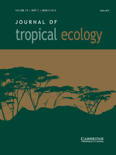
JOURNAL OF TROPICAL ECOLOGY
Navigating the Challenges of Tropical ConservationThe JOURNAL OF TROPICAL ECOLOGY, published by Cambridge University Press, serves as a pivotal platform for advancing knowledge in the field of ecology, particularly within tropical environments. With an ISSN of 0266-4674 and an E-ISSN of 1469-7831, this esteemed journal has been a key resource since its inception in 1985, maintaining a focus on empirical research that addresses the complexities of tropical ecosystems. It holds a respectable Q3 ranking in the Ecology, Evolution, Behavior and Systematics category as of 2023, indicating its significant contribution to the field, although it remains within the competitive mid-range. The journal publishes original research, reviews, and methodological articles that illuminate the rich biodiversity and unique ecological processes of tropical regions, fostering a deeper understanding of conservation challenges. Accessible from the United Kingdom, this publication appeals to a diverse audience of researchers, professionals, and students keen on exploring ecological dynamics in tropical settings, and plays a crucial role in promoting scientific discourse and collaborative efforts aimed at preserving our planet's vital ecosystems.
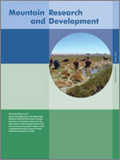
MOUNTAIN RESEARCH AND DEVELOPMENT
Elevating mountain studies for global impact.MOUNTAIN RESEARCH AND DEVELOPMENT is a premier open-access journal dedicated to advancing the understanding of mountain environments and communities through rigorous research and interdisciplinary collaboration. Published by the International Mountain Society since 1981, this journal serves as a vital resource for researchers, professionals, and students in the fields of development, environmental science, and environmental chemistry. With a commendable impact factor reflected in its Q2 and Q3 quartile rankings in 2023 across various categories, it offers a platform for innovative studies that address the unique challenges facing mountainous regions globally. As a vital conduit for knowledge exchange, MOUNTAIN RESEARCH AND DEVELOPMENT fosters the dissemination of research findings, insights, and practical applications aimed at enhancing the sustainability and resilience of mountain ecosystems. Its open-access model, implemented since 2009, ensures that research is accessible to a broad audience, contributing to the ongoing dialogue in mountain studies and related fields. For detailed inquiries, the journal is hosted at the University of Bern, Switzerland.

Journal of Mountain Science
Advancing Insights into Earth's Majestic Mountain EnvironmentsThe Journal of Mountain Science, published by SCIENCE PRESS, is a distinguished academic journal dedicated to advancing the understanding of mountain environments and their significance in various scientific domains. With an ISSN of 1672-6316 and an E-ISSN of 1993-0321, this journal has carved a niche in the field of Earth sciences, earning a commendable Q2 ranking in categories such as Earth-Surface Processes, Geography, Planning and Development, and Geology, as well as a Q3 ranking in Global and Planetary Change. Since its inception in 2007, the journal has been pivotal in fostering interdisciplinary research that addresses critical environmental issues, making it an essential resource for researchers, professionals, and students alike. While currently not offering open access, it provides valuable insights into areas including nature conservation and landscape management, with a focus on the unique challenges faced by mountainous regions. Located in Beijing, China, the Journal of Mountain Science continues to promote scholarly discourse that contributes to the sustainable development of mountain communities and ecosystems until 2024 and beyond.
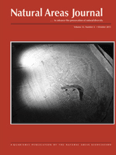
NATURAL AREAS JOURNAL
Advancing Knowledge for Nature's PreservationNATURAL AREAS JOURNAL, published by the NATURAL AREAS ASSOCIATION, serves as a vital resource for scholars and practitioners in the fields of ecology and nature conservation. Since its inception in 1993, this quarterly academic journal delivers original research, case studies, and reviews that focus on the preservation of natural areas and the intricate relationships within ecosystems. The journal, indexed under ISSN 0885-8608 and E-ISSN 2162-4399, currently holds a Q3 quartile ranking in both Ecology and Nature and Landscape Conservation as of 2023, reflecting its commitment to advancing knowledge in these essential areas. With Scopus rankings placing it at the 39th percentile in Nature and Landscape Conservation and 36th in Ecology, the NATURAL AREAS JOURNAL is an influential platform that fosters interdisciplinary collaboration and advocacy for conservation efforts. Although it currently does not offer Open Access options, its contributions are pivotal for researchers, professionals, and students seeking to explore, understand, and contribute to conservation science.

CORAL REEFS
Navigating the Future of Marine ConservationCORAL REEFS is a prestigious academic journal dedicated to advancing the understanding of coral reef ecosystems and promoting research in aquatic science. Published by SPRINGER, this journal has established itself as a leading platform in the field, with an impressive impact, ranked in the top quartile (Q1) for Aquatic Science in 2023. With its comprehensive focus, CORAL REEFS covers a wide array of topics, including ecology, conservation, and management of coral reefs, making it an essential resource for researchers, professionals, and students alike. The journal has been in continuous publication since 1982 and aims to foster collaboration and innovation among the global scientific community. Although not open access, access options are available through institutional subscriptions, enhancing the dissemination of groundbreaking research. The journal stands out for its contribution to understanding the complex dynamics of aquatic systems, solidifying its role in guiding future research and policy in marine conservation.
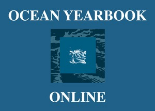
Ocean Yearbook
Bridging Disciplines for a Sustainable Ocean FutureOcean Yearbook, published by BRILL, is a leading academic journal in the field of maritime law and ocean governance, providing a comprehensive platform for researchers and practitioners in this vital area. With an ISSN of 0191-8575 and E-ISSN 2211-6001, this journal offers valuable insights and critical analyses on contemporary issues affecting the world's oceans, promoting interdisciplinary dialogue among scholars in law, environmental studies, and policy-making. Currently ranked in the Q2 quartile for Law, this journal is positioned among the top-tier publications, reflecting its commitment to academic excellence and relevance. Ocean Yearbook is essential reading for those looking to stay abreast of legal developments and emerging challenges in ocean governance, contributing significantly to policy discussions and academic scholarship worldwide. Its accessibility through subscription, combined with its ongoing commitment to high-quality research, makes it an indispensable resource for students, researchers, and professionals dedicated to understanding and protecting marine ecosystems.
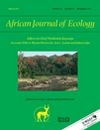
AFRICAN JOURNAL OF ECOLOGY
Connecting Research and Conservation in AfricaThe African Journal of Ecology, published by Wiley, is a leading academic journal in the field of Ecology, Evolution, Behavior, and Systematics. Established in 1963 and continuing its vital contributions to the field until 2024, this journal serves as a premier platform for researchers and scholars to share groundbreaking studies that explore the intricate relationships within ecosystems, particularly in the African context. With an impressive Scopus Rank of #423 out of 721 and a Q3 Quartile ranking, it stands as a credible source of scholarly information, gaining recognition among peers for its rigorous peer-review process and impactful publications. While the journal is not open access, it remains influential in driving advancements in ecological research and providing insights vital for conservation efforts and biodiversity studies. Authors and readers alike will find that the African Journal of Ecology not only promotes scientific inquiry but also fosters a deeper understanding of ecological dynamics that affect our world.
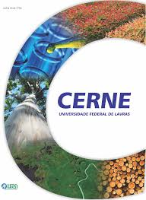
Cerne
Pioneering Research for the Future of ForestryCerne is a distinguished open-access journal dedicated to advancing knowledge in the field of forestry, published by the Universidade Federal de Lavras (UFLA). Since its inception in 1994, the journal has actively contributed to the global discourse on sustainable forest management and biodiversity conservation, presenting research findings that are both relevant and impactful. With its ISSN 0104-7760, Cerne aims to foster collaboration among researchers, professionals, and students, enhancing the understanding of forestry practices in Brazil and beyond. As of 2023, it holds a respectable Q3 ranking in the forestry category, further cementing its position within the academic community, illustrated by a Scopus ranking of #97 out of 174 in the Agricultural and Biological Sciences - Forestry field. Operating under an open-access model allows for wide dissemination of research outputs, ensuring that critical findings reach a broad audience, fueling further innovation and discovery in the field. With converged years extending from 2007 to 2024, Cerne continues to be a vital resource for anyone engaged in forestry research and practices.

Nature Conservation Research
Advancing conservation science for a sustainable future.Nature Conservation Research is a prominent open-access journal that has been dedicated to advancing the field of conservation science since its inception in 2016. Published by the SARANSK FOND PODDERZKI & RAZVITIA ZAPOVEDNYH in the Russian Federation, this journal serves as a vital platform for researchers, professionals, and students alike, providing critical insights into ecological and environmental issues. With an impressive impact factor and ranked in the second quartile across multiple categories—including Agricultural and Biological Sciences, Earth and Planetary Sciences, Ecology, and Nature and Landscape Conservation—Nature Conservation Research stands at the forefront of impactful scientific discourse. The journal not only aims to disseminate high-quality research findings but also seeks to foster collaboration and innovation in conservation practices globally. By ensuring open access to its content, it promotes widespread dissemination of knowledge, crucial in the fight against biodiversity loss and environmental degradation. Researchers and practitioners contributing to the journal will find themselves at the convergence of science and conservation efforts, paving the way for sustainable ecosystem management.
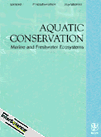
AQUATIC CONSERVATION-MARINE AND FRESHWATER ECOSYSTEMS
Fostering interdisciplinary insights for ecosystem resilience.AQUATIC CONSERVATION-MARINE AND FRESHWATER ECOSYSTEMS, published by WILEY, is a premier international journal dedicated to advancing the understanding of aquatic ecosystems and their conservation. With an impact factor reflecting its significant influence and a distinguished position in the Q1 quartile across key categories such as Aquatic Science, Ecology, and Nature and Landscape Conservation, this journal serves as an essential resource for researchers and professionals engaged in the study and protection of marine and freshwater environments. Covering a broad array of topics, from ecosystem management to conservation strategies, the journal encourages the dissemination of innovative research and interdisciplinary perspectives. Although it is not an open-access publication, this journal is esteemed for its rigorous peer-review process, facilitating a platform where vital research influences policy and practice in the aquatic sciences. Established in 1991, AQUATIC CONSERVATION continues to be a cornerstone in the academic exploration and safeguarding of aquatic ecosystems through to its converged years of 2024 and beyond, providing a critical lens for the future of environmental sustainability.